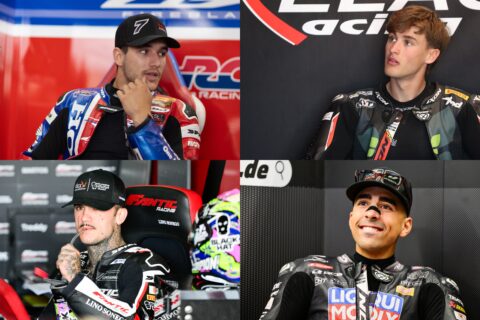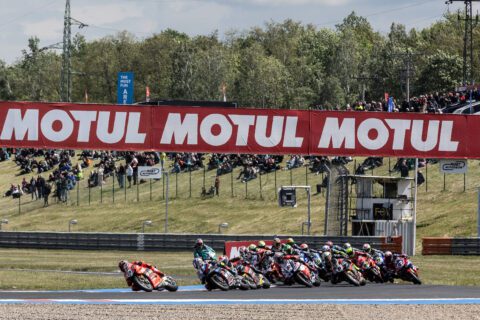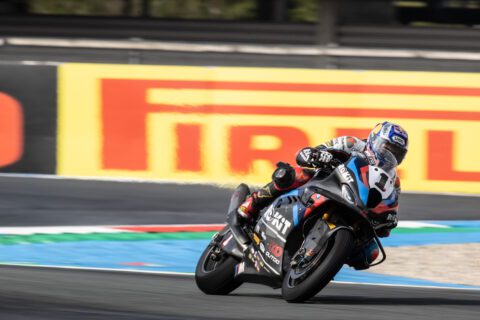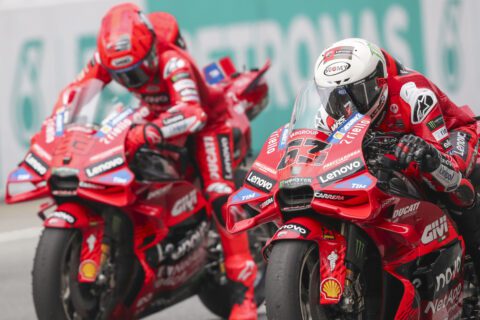In an ideal world, anyone who wanted to go racing would be instantly supplied with a very rich father, full Governmental support or access to Marlboro’s chequebook. Sadly, a minority has the first, no-one has the second and only two riders have the third.
Motorsport, whether on two wheels or four, costs money. And it has to come from somewhere. Some have parents that believe in their kids enough to up sticks, move continents and live in a caravan just outside a small Cumbrian market town in order for their offspring to fulfill lifetime ambitions.
But they are in a minority…
So where does the cash come from? Sponsors. Which is easy to say because when you look at big-league paddocks around the world, there are logos from blue chip companies plastered all over articulated lorries. It’s a worry, however, when you find out Ducati is the only manufacturer to actually make money out of MotoGP. Its sponsorship revenue just about outweighs the costs of going racing.
Comparisons between MotoGP and F1 cannot be drawn though. What Repsol Honda, for example, would spend on a season’s competition (roughly $20m), its F1 equivalent will spend on a single race.
Getting sponsorship at grass-roots level is no easier or more difficult than at a high-level, because the higher you go, the more you need. And sometimes your own team doesn’t always make it easy for you.
“When I was at Kawasaki there were two main problems gaining sponsorship,” remembers former Airwaves Yamaha team boss Colin Wright, “Kawasaki insisted the bikes had to stay green and the TV coverage was minimal.
“Kawasaki had Rizla as a sponsor and [then BSB top man] Doug Barnfield told us we had to tape over the brand as the BBC classed Rizla as a tobacco related product!
“The majority of sponsors, in the old days, were closely-related to the motorcycle industry I think we achieved about a third of Kawasaki’s total budget in sponsorship. I wouldn’t say it’s any easier today but the BSB platform is far more professional and therefore more blue chip companies have an interest.”
WHO DO YOU RING?
Going after sponsors is a funny old game but you can apply the Six-P Principle to it – Pre-Planning Prevents Piss-Poor Performance. You have got to know what you want and be realistic about what they can give you.
"It's no good visiting a local coachworks company with the singular thought that you need £10,000 to fund your season’s racing and he can either give you all or part of that depending on what percentage of your bike he wants painted in his colours," says former racer and ThundersportGB boss Dave Stewart.
"Your bike may seem to be the main area of importance to you, but realistically you are the main part of what you have to sell, not the bike. He's far more likely to be willing to paint your bodywork and van than he is to part with actual cash as a first foray into motorcycle sponsorship.
"That is still very valuable to you, because if all your kit looks professionally turned-out you are more likely to attract other sponsors. Remember, you'd have to part with your own cash to attain that level of presentation and it's probably in your original £10k budget so it's worth a lot."
What do they get out of it? Be realistic and don’t tell them one thing and let them down halfway through a season. Underpromise and overdeliver, if you like.
“All sponsors do and should expect a return on their investment whether it be financial return or attract media value,” adds Wright. “It is important to research the companies you are trying to attract and understand what they might want from you. If you can provide what they want, you are halfway there. A lot of teams promise everything and deliver nothing – not good for the sport.”
DOING THE DEAL
Once your foot is in the door, you need to talk to the potential sponsor on his or her own terms. Don’t appear at a local garden centre in your dad’s BMW M3, waving an Apple Mac around, spouting nonsense about PowerPoint presentations that you simply must show them, darling...
On the flip side of that, don’t rock up to GlaxoSmithKline looking like Wurzel Gummidge after a two-week bender in Amsterdam. Remember you’re selling yourself, so get on the business end of a Gillette Mach3 and a book a trip to the barber’s.
“Treat it like a job interview,” says recruitment consultant Mark Easterbrook. “Preparing for whatever questions you think they might throw at you is always a good plan as you will appear confident about the product, which is you.
“Remember to speak up, look the person in the eye; don’t mumble and play with your pen as that is a dead giveaway about a person who is winging it. It’s not so much like making a speech, but if you can have the answers to questions ready in your head, then it will be a far easier ride for you and them. And avoid the dreaded words ‘er’ and ‘umm’.
“Make sure you are intimate with the potential sponsor’s business or product. If you can demonstrate an interest in what they do, then they are far more likely to take an interest in what you do.”
If you aren’t confident about your potential performance in a meeting, take someone who is and it needn’t necessarily be your dad, as parents tend to be biased and might talk you out of a deal as their perceived value of you is more than the actual fact.
A friend experienced in sales or marketing would be an ideal in-meeting companion as they will be able to weigh up the situation fairly quickly and be able to steer the conversation in the right direction, as well as selling your proposition.
“Don’t let them do more than 50 per cent of the talking,” warns Easterbrook. “The sponsor is just as interested in you as he is the package you are proposing. If he doesn’t hear what you have to say, then he is far less likely to help you because your mate isn’t riding the bike or marketing his product, you are.”
GIVING THEM VALUE
"Try to interest your sponsor in the actual events. A lot of people have never visited a motorsports venue and don't realise that the participants are extremely accessible to someone involved with a team," says Stewart.
"Offer to show them around an event, with a couple of business associates as well if they want, and involve them in what you actually do. Whether they want to come along initially or not, always keep them up to speed with what you've been doing.
"Take them a couple of action shots in decent frames that they can either display in their reception area or put on display somewhere in their office. This is useful in reminding them about your activities and makes them feel that their support is valued."
Some sponsors will want different things from others. A majority, at least at club level, are after media coverage in local newspapers and on the radio which equates to free advertising in their heads.
It might be a local timber warehouse or bodywork shop, but if they advertise locally on a regular basis, they probably understand the benefits of self-promotion and are more likely to give you a few quid if they know that it will get them extra local coverage in the sports pages.
Write press releases and include good pictures. If you don’t feel confident about being able to do a good job, then include a media service in your season’s budget. If your sponsors are perceiving the value of coverage well, they are more likely to come back. Large companies like HM Plant will hire other firms to calculate their return on investment.
HM Plant boss John Jones committed a serious amount of cash to a World Superbike team when his business wasn’t doing so well. In a recent book, Jones said the amount of coverage his company received because it was on the telly every other weekend on the side of a bike worked wonders.
ONCE YOU’VE GOT 'EM, KEEP 'EM
One of the main reasons GSE’s team principal Darrell Healey got into racing British Superbikes was because he didn’t think existing sponsors got anything like the value for money they should be. Healey was one of the first to turn up in big trucks and offer sumptuous hospitality because he knew how to give sponsors value and they were more likely to sign up again the following year.
Electronics giant Hannspree got into World Superbikes after giving some backing to one rider. It became the series’ title sponsor because of the value it perceived from that one rider’s initial enthusiasm.
“If you start off with a bit of sponsorship from the local coachworks and make sure you look after them, they are going to be a valuable source of contacts for other potential sponsors,” says Stewart.
“They may be a very important customer to the local auto factors, so much so that at a little nudge from the coachworks, the auto factors might be persuaded to contribute towards your entry fees or tyres.
“These local businessmen will often know each other on a personal level and if you can get them to come along to an event and they have a good time (and very importantly feel involved) they will often introduce you to someone else who will also want a piece of the action.
“If it's seen as a good fun day out for them, it has an added value and they will start looking forward to the races as much as you do. Once your sponsors start to get a proprietary feeling about you and your bike, they will start putting actual cash into your efforts.”
Riders who make a name for themselves and, by association their sponsors, become valuable marketing tools to their backers. Making yourself and your bike available to your sponsors for open days and corporate events will increase your perceived value.
Riders of Valentino Rossi’s stature will be seen in adverts for AGV, Dainese and Wudy hotdogs, of all things, because the companies see that an association with him improves their brand perception. It’s no coincidence that Tommy Hill can be seen at big Yamaha dealer open days or events around his sponsors.
“Obviously at the end of the day your first aim is to try and sign someone who will win the relevant championship and you are looking for someone who has signed with a good team, is capable and will represent your brand well both on and off the track,” says Wendy Hearn, of Arai importers Phoenix NW.
“We try and involve as many of our riders as possible in open days, events, etc. so you need someone who can communicate well with people. Then there are some riders who probably won’t win but have great support from the public and are well liked, and for this reason generate a lot of publicity.
“It’s good to look at the young riders who are coming through and try and catch them early on also with Arai we are very loyal with our riders and support them through the good years and the bad so there is a certain amount of guys who have been with us for a long time and we like that continuity.”

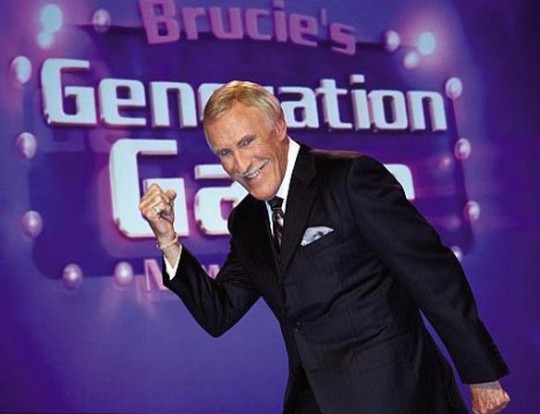
![Shane Byrne, Monstermob Ducati, 2003 WorldSBK, action [Gold & Goose]](https://bikesportnews.com/wp-content/uploads/2025/07/Shane-Byrne-Monstermob-Ducati-2003-WorldSBK-action-Gold-Goose-480x272.jpg)
